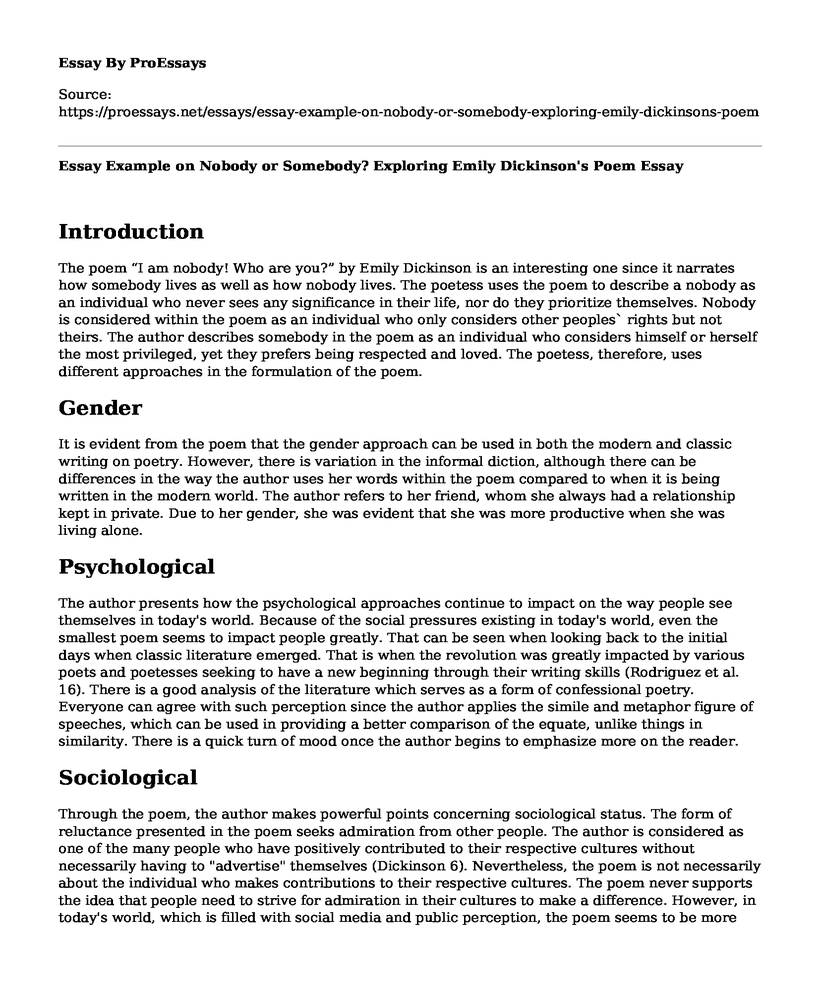Introduction
The poem “I am nobody! Who are you?” by Emily Dickinson is an interesting one since it narrates how somebody lives as well as how nobody lives. The poetess uses the poem to describe a nobody as an individual who never sees any significance in their life, nor do they prioritize themselves. Nobody is considered within the poem as an individual who only considers other peoples` rights but not theirs. The author describes somebody in the poem as an individual who considers himself or herself the most privileged, yet they prefers being respected and loved. The poetess, therefore, uses different approaches in the formulation of the poem.
Gender
It is evident from the poem that the gender approach can be used in both the modern and classic writing on poetry. However, there is variation in the informal diction, although there can be differences in the way the author uses her words within the poem compared to when it is being written in the modern world. The author refers to her friend, whom she always had a relationship kept in private. Due to her gender, she was evident that she was more productive when she was living alone.
Psychological
The author presents how the psychological approaches continue to impact on the way people see themselves in today's world. Because of the social pressures existing in today's world, even the smallest poem seems to impact people greatly. That can be seen when looking back to the initial days when classic literature emerged. That is when the revolution was greatly impacted by various poets and poetesses seeking to have a new beginning through their writing skills (Rodriguez et al. 16). There is a good analysis of the literature which serves as a form of confessional poetry. Everyone can agree with such perception since the author applies the simile and metaphor figure of speeches, which can be used in providing a better comparison of the equate, unlike things in similarity. There is a quick turn of mood once the author begins to emphasize more on the reader.
Sociological
Through the poem, the author makes powerful points concerning sociological status. The form of reluctance presented in the poem seeks admiration from other people. The author is considered as one of the many people who have positively contributed to their respective cultures without necessarily having to "advertise" themselves (Dickinson 6). Nevertheless, the poem is not necessarily about the individual who makes contributions to their respective cultures. The poem never supports the idea that people need to strive for admiration in their cultures to make a difference. However, in today's world, which is filled with social media and public perception, the poem seems to be more relevant today than its initial period of writing.
Conclusion
In conclusion, the author uses the poem to depict her true nature. The author presents her capability of explaining different approaches lightly. The author illustrates how some people consider themselves superior to others, which makes them think that the world needs to revolve around them while not seeing any signs of other people. Such people that consider themselves "somebody" are always addicted to their behavior while they never consider giving anything to others. However, they expect to receive things from other people.
Works Cited
Dickinson, Emily. I am nobody! Who are you?. Stemmer House, 1978.
Rodriguez Martínez, Ana Karina, and Emily Dickinson. "Lectura de poema: I Am Nobody! Who Are You?. Escrito por Emily Dickinson." (2020).
Cite this page
Essay Example on Nobody or Somebody? Exploring Emily Dickinson's Poem. (2023, Aug 29). Retrieved from https://proessays.net/essays/essay-example-on-nobody-or-somebody-exploring-emily-dickinsons-poem
If you are the original author of this essay and no longer wish to have it published on the ProEssays website, please click below to request its removal:
- Literature Essay on the Canterbury Tales Prologue as an Introduction
- Literary Essay - The Stylistic Devices Used to Present the Theme of Paralysis in Joyce's Dubliners
- The Second Coming by William Butler Yeats Essay Example
- Paper Example on Feminism in The Scarlet Letter by Nathaniel Hawthorne
- Essay Sample on Mythology: Gilgamesh and Adam & Eve
- Mythology Book Report and Review Paper Example
- Paper Example on Feminist Poetry: A Movement of Self-Realization & Social Awareness







